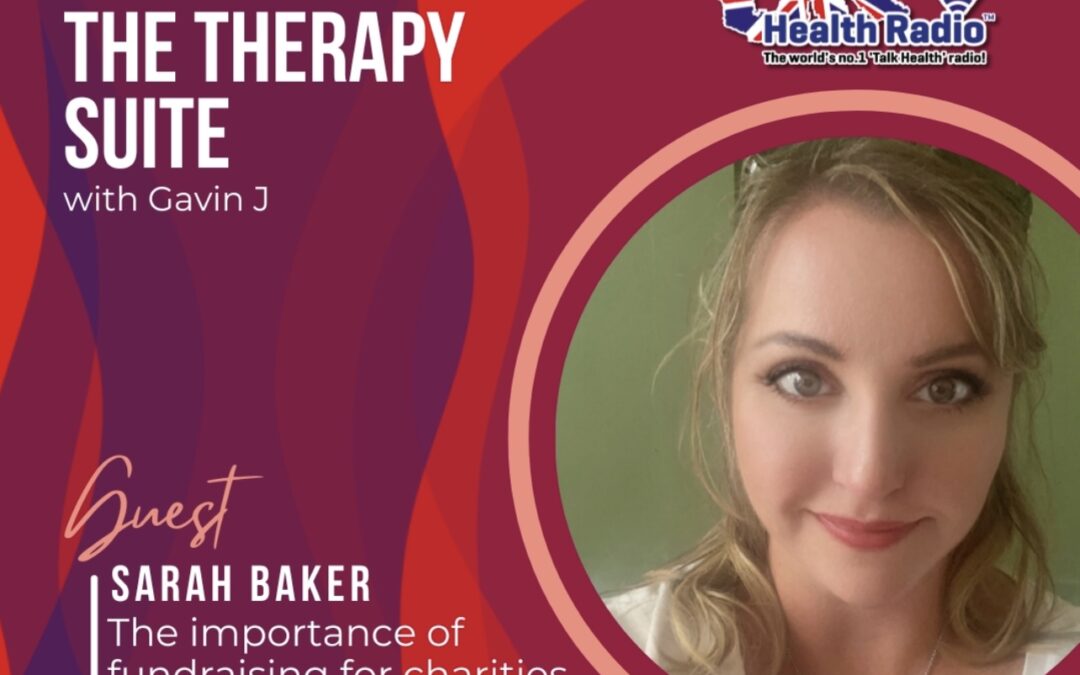We were invited to speak on UK Health Radio recently and for anyone who can’t listen to the podcast, the main interview questions and answers can be found below.
- Sarah, can you tell us about Myocarditis UK and its mission? What are the key goals of the charity?
Only Myocarditis dedicated charity in UK.
3 Main Aims: Awareness. Prevention. Cure.
Mission: Is to make myocarditis a household name. In the past we would say “Myocarditis” and people would say “what?” But thanks to ongoing awareness campaigns it’s now becoming more well-known. We want it to be talked about. Be commonly understood. To have information available to everyone who needs it. No one should have to suffer or feel vulnerable due to lack of information. Heart Health and the importance of it is something that we should all be aware of – not just an old or unhealthy persons concern.
- The Neil Bowler Bike Ride sounds like an exciting fundraising event! How did this partnership with the hotel industry come about? Why is it important?
Our founder, Andy Jansons, works in the property sector so we have been fortunate to spread awareness in this sector and be given opportunities. The Neil Bowler Bile Ride also has connections to cardiac conditions as Neil sadly died on day 1 of the race in 2018 from cardiac arrest. Not Myocarditis. They have raised over £40,000 for worthy causes and we have been honoured to be one of them. Charities working together is a bit of a sticking point for some, but we believe that we maximise success by helping other charities or working with them. For example, we sponsored a heart screening event with another charity CRY, to give free heart screening to pupils at John Hampden grammar school, (Wycombe,) it is all about awareness and saving lives.
- How much money was raised during this year’s hotel bike ride, and how will these funds help further myocarditis research?
£5,830
We have a 2 year funding plan in which we have pledged 200K over the two years so this will be a significant step towards honouring those pledges. I don’t think people always realise that Funding Research is also about people. Many of our bigger research projects do qualify for further funding but we have to get them to a certain level first. A proof of Concept if you wish. We support young researchers on their development journey by part funding salaries etc in the early years and many of these researchers go on to make significant and ground-breaking research achievements. We have over the years had our researchers go on to win academic acclaim eg:
- Paz Patal – Lorreal Woman in Science Award
- Also: runner up in very prestigious Medical Research Council Intermediate Fellowship
- Her current focus is on role of gender in myocarditis and cardiomyopathy: 70% men 30% women get it but why?
- Dr Amrit Lota won the British Society of Heart Failure Young Investigator Award for his work in genetics and myocarditis- this has been a gamechanger and is a huge part of our forward planning fundraising and research stratedgy. Has galvanised national and international attention and support in myocarditis research.
- We are definitely #SmallButMighty
- What have been some of the biggest fundraising successes for Myocarditis UK over the past few years?
It is hard to separate fundraising success from general successes as they have a symbiotic relationship but we find that fundraisers that are fun are the most successful.
When it comes to corporate involvement, we know that everyone like to have fun at the directors expense – in a good natured way of course so things like getting people to bid on who gets to push their boss down a hill in a big ball or make him jump out of a plane for skydiving etc works well.
We have also been very blessed by an anonymous donor who believes in our cause as much as we do and who has helped our fundraising significantly over the past 2 years but we are grateful to everyone who donates.
- As Head of Development, what are some of the most effective fundraising strategies you’ve found for health charities like yours?
Be patient. Fundraising for niche causes is not the same as fundraising for more general causes. Make the most of opportunities that come your way. Understand that not all fundraising is monetary.
We have been privileged to work with and be supported in kind by a number of corporates who have allocated some of their time or resources to us or who have helped employees in their fundraising challenges either by matched funding or by giving them time off to complete fundraising challenges.
FlourishPR – Give time and resources to help with press releases, engaging media etc.
nCino – employees time off to cycle from London to Paris and matched the funding.
Rui Soares – Professional Squash player. Wears our logo on all his coaching and training gear and has hosted a squash tournament for us. He also tags and shares our charity on all his pro-squash social media.
Berkshire Property Awards – Made us their chosen charity for the evening allowing us to network.
AHC – we were their chosen charity and it afforded us the opportunity make new contacts and to bring myocarditis to a new audience.
- How has the COVID-19 pandemic impacted Myocarditis UK’s fundraising and awareness efforts?
Like all charities we took a hit but we were fortunate to ahead of the game in some areas, so we weren’t as hard hit. We have always prided ourselves on being 100% non-profit, so we were already saving money when it came to flexible working, reducing overheads etc. It did help us to expand our reach as we used social media to engage with our supporters and get new ones.
- What advice would you give to individuals looking to fundraise on behalf of Myocarditis UK?
Anything goes. Doesn’t have to be big or splashy. Just do it and we are so grateful! We’ve had everything from sponsored dog walking to cake sales to marathons. It’s not about how much you can raise. It’s about the fact that you want to fundraise for us. So just go for it.
Tips:
- Use social media. Make posts, reshare posts that anyone who supports you makes – it’s a massive tool.
- If you don’t know how to use Just Giving – call us and we will help you.
- Tell people why you want to do this.
- We are launching a fundraising kit in the next few months with downloadable posters etc to help.
- If you want to take on something big, speak to your work and see what they offer to help you. Like volunteering days, using company intranet to spread awareness etc.
- How can listeners get involved with and support Myocarditis UK, whether through donations, volunteering, or fundraising events?
Donating money is easy via the website. BUT you can also donate in other ways – prizes, venues, drinks etc.
Our events are always on our website.
Volunteering is slightly more difficult than mainstream charity volunteering as we don’t have high street shops etc, but we are always looking for extra hands at events or for opportunities to talk about myocarditis. Just chat to us.
- What exciting projects or research is Myocarditis UK focused on funding right now?
We have been going for 10 years and I’m always amazed at how we’ve come. From no myocarditis specific research being done in the UK to internationally acclaimed research in genetics.
Now we are on to the next step of the journey which is asking stem cells and growing simulated hearts in the lab to test these genetic markers on. We were privileged to be invited to the lab to Meet Momina Yazdani – one of the researchers in this project – and to see the little hearts in the petri dishes. It’s an incredibly time-consuming process and she is amazing. The hearts take between 40 -45 days to be ready for working with and in that time, they have to be fed at the exact same time every day which as you can imagine is difficult so we have allocated some of our funding towards helping Momina with an assistant to take some of that pressure of her
We use these stem cell hearts – the tissue had been donated by patients with myocarditis -and we begin the slow process of programming them with various gene combinations so that we can work out how to switch them off safely and what target specific treatment we can make for myocarditis. There is currently no specific medication for myocarditis. HUGE step towards a cure. A long way off but we have definitely started the journey.
- What inspires you personally in your role at Myocarditis UK? Why is this cause so important to you?
- I love what I do. I love that no day is the same and I never know who I’m going to meet -I’m a people person and I love hearing about people’s lives, their stories etc. The challengers are different from month to month and some days I have moments when I think I can’t do this, but it has to be done and before you know it, it’s being done. I’m not alone, I have some wonderful people backing me up which definitely helps, And the Jansons family are an inspiring bunch of people to work with, it’s hard not to let that rub off on you.
When I first started to learn about myocarditis and what it is, I was shocked that so few people, and even medical personal, knew what it was and how it presented etc. When you look at the stats
- Stats: 1 young person per week dies in UK from myocarditis
- It’s the 32nd leading cause of death worldwide.
- Some of the newer research coming out but its unconfirmed is that myocarditis is looking like the 3rd or 4th biggest contributor to sudden death in children and young adults in the developed world.
It’s not about scaring people. We don’t want to do that as the majority of people with myocarditis do go on to make a full recovery. But when you look at those stats I can’t help but think maybe I’ve been lucky and I don’t want to rely on luck . People shouldn’t have to rely on luck.
I want to make a difference.
- What fundraising approaches tend to resonate best with donors when it comes to health charities compared to other types of non-profits? Are there certain messaging strategies you’ve found most effective?
Listen to people’s experiences and stories and ask yourself How can we fix/change/ improve that. Then do it. Create a challenge or a goal around that so that people can identify with what you’re trying to achieve, and you will be amazed at how many people want to help and be involved. This may sound controversial but sometimes it’s not about the big picture but about the little picture. How does myocarditis affect this aspect of a persons life or how can we get more information to more people and then working to make that happen.
- With so many worthy health causes seeking donations, how does Myocarditis UK differentiate itself and connect with supporters? What key ingredients have you found lead to fundraising success specifically for medical research charities?
Keep it real and keep it authentic. Most engage with health-based charities due to a personal connection and we respect that. We try to engage with our supporters and make the fundraising event special to them. We have our story but remembering that they have theirs and being sensitive to that. Understanding that medical research is a bit of a hard sell as we can’t always show in picture or social media type content what we have done with the money so we try to be as available as possible – if people have questions we do our best to answer them. It’s about making the research that we fund applicable to everyone – sharing what we do and more importantly why we have chosen to fund that research. What’s the biggest impact we can get out of every step forward.






